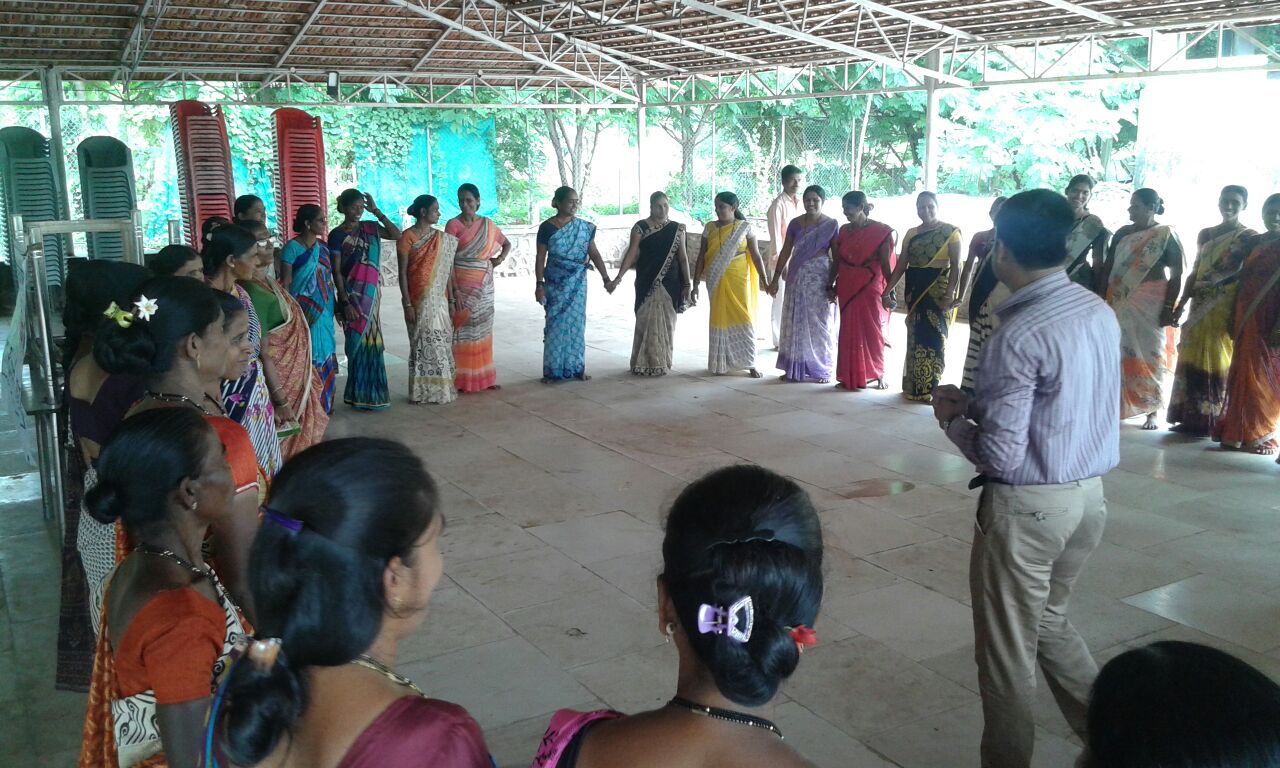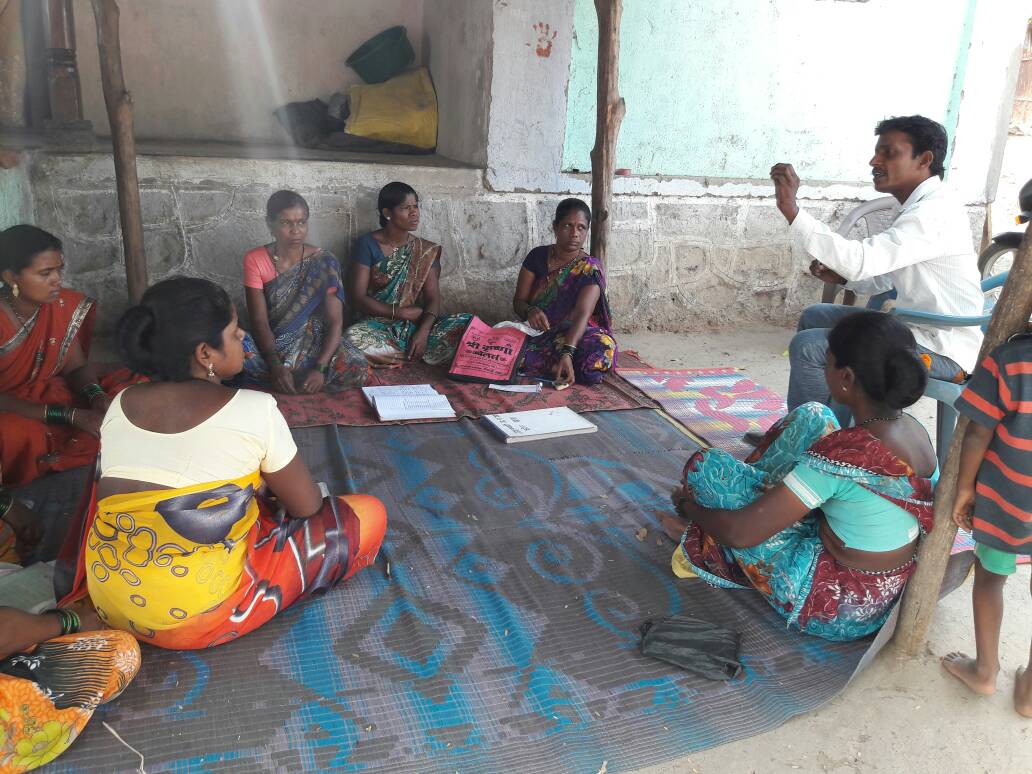Constitution in Hand, These Citizen Heroes Are Empowering People Through Civic Education.
An inspiring story of citizen heroes of today’s independent India.

Ghodgaon, one of the many villages in the area of Ganeshpuri, district-Thane, Maharashtra long suffered from scarcity of drinking water. The issue of Ghodgaon prevailed particularly because of the damaged and age-old pipeline. Devidas, Pranali and Mamta, the three community leaders, had been frequent visitors to Ghodgaon for their work with the women of self help groups. The trio decided to help women on this crucial issue. They held several meetings with women and guided women to work with the Panchayat to find a solution. The interesting piece of this story is that very often, the trio had been seen carrying a particular book to their meetings. According to them, this book paved the way for their civic initiative.
When inquired about it, this book turned out to be none another than our very own Constitution!

Mahendra, another community leader, too, is seen carrying a hard-bound paperback with him to his meetings in villages. Villagers have noticed this change too. In meetings, often Mahendra refers to the paperback and pursues women to actively participate in upcoming Gramsabha on 15th August. Isn’t it easy now to guess what Mahedra carries to his meetings?
When asked about it, Devidas said, “Some months back we got an opportunity to be part of a citizenship programme that introduced us to the Constitution of India. The Indian Constitution literally covers everything. We learnt about our fundamental rights and responsibilities, duties of the state, how laws are made and most importantly how the Panchayat functions. Till now we knew that everyone should attend the Gramsabha. But after referring to the Constitution and the Maharashtra Village Panchayat Act, we understood the why aspect of it. This programme ground the idea in us that our work on issues around us must be backed by the knowledge about the constitutional framework. In fact, that’s how it is supposed to be. Not just the community leaders, but every villager that we work with, should be equipped with the essential civic knowledge about the Constitution, Acts, Government orders, guidelines etc. that govern our systems. This motivated us to introduce the Constitution to the women in Ghodgaon. We explained to women how a well informed application to Panchayat can be written by using references to the Constitution, Acts and other Sarkari documents. They did the same and followed up rigorously on it to get the desired results.”
The Constitution of India has entrusted its citizens with the supreme power. The beginning of the Preamble to the Indian Constitution – ‘We, The People of India’ and the end – ‘We give ourselves this Constitution’ affirms the ownership of the Constitution by its people. And the best place to practice this mandate is at the village level, in our Panchayats. However, the reality in our villages had been far different from this vision till 1992. If we take into account the trajectory of working of the Panchayati Raj Institutions in India, it is surely not an exaggeration to say that the 73rd Amendment Act, 1992 revamped the inefficient working of the Panchayati Raj Institutions that existed since independence. Prior to 1992, the Panchayati Raj Institutions suffered from irregular elections, prolonged super-session, insufficient representation of weaker sections, inadequate devolution of powers and lack of financial resources.
Stating the challenges above, the 73rd amendment placed decentralisation at the forefront of this transformation.

Provisions like making Gramsabha (village assembly of adult citizens in village) the central piece in the local government, reservations for women, SC and ST communities and participatory budget making among others have assured that the ultimate power to decide the fate of villages lies with its citizens.
Article 243 inserted by the 73rd Amendment Act guarantees significant powers of Gramsabha by saying that the Gramsabha can play roles akin to that of the legislature at state and the central levels. This kind of responsibility seeks an intense engagement of the Gramsabha members in all the facets of working for their Panchayat. And such sort of engagement from the Gramsabha members can only be attained by equipping them with the right civic knowledge and civic skills.
This year marks the 25th year of the 73rd Amendment. At this junction, we have achieved a lot to be proud about and yet have to be cognizant of the grave challenges that loom over us even today. The chief challenge remains – the capacity building of the two stakeholders namely the Gramsabha members and the Grampanchayat members (elected representatives) on their roles. In the last several years, the need for capacity building of the Grampanchayat members has been somewhat on the radar of government policies and efforts have been made in that direction. However, the aspect of training the other key stakeholder i.e. the Gramsabha members on civic knowledge and skills required for their role has remained widely unacknowledged till date. Sadly, the gap in skill building of Gramsabha members prevails in most of our villages today.
In the light of this grim reality, the efforts made by the community leaders like Mahendra, Devidas and his Saathis to build civic literacy are exemplary.

This much needed intervention undoubtedly extends a notable contribution towards strengthening of our Panchayati Raj Institutions. And using the Constitution of India as foundation for this, making it all the more holistic. “This is just the beginning”, says Ravsaheb – the person who leads the team of these community workers. He assures this is a wave of the future for the villages in and around Ganeshpuri. The team has made a resolution to run the programme ‘Constitution, Gramsabha and I’ in villages on a continuum. This 15th August, when the whole country is celebrating our independence and remembering our great freedom fighters, this small team of citizen heroes is making a tryst with our Constitution and their Saathis to build civic literacy are exemplary.
Written by Bhakti Prabhakar Bhave.
Click here to find out more about how you can help We, The People spread civic education.
Like this story? Or have something to share?
Write to us: [email protected]
Connect with us on Facebook and Twitter.
NEW: Click here to get positive news on WhatsApp!
This story made me
-
97
-
121
-
89
-
167
Tell Us More
We bring stories straight from the heart of India, to inspire millions and create a wave of impact. Our positive movement is growing bigger everyday, and we would love for you to join it.
Please contribute whatever you can, every little penny helps our team in bringing you more stories that support dreams and spread hope.



















